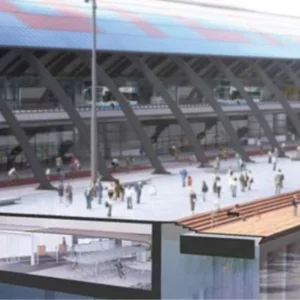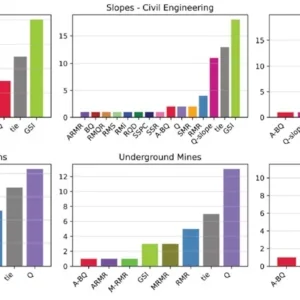A good year behind and A bright horizon is ahead for the future.
Normet International vice president of ground control and construction Technology, Himanshu Kapadia explains that 2018 has been a “great year” thanks to a growth in mining and tunnelling markets.
“A rise of over 20 per cent in Normet’s machinery business is the result of an increase in the market share as well as entering new markets,” says Kapadia. “The tunnelling industry is growing at a steady pace of approximately 7 per cent year-over-year.”
Aaro Cantell, interim CEO of Normet Group says, “Normet posted a very strong fiscal year 2018. Turnover grew by 21 per cent to EUR 315M (USD 353.2M) and earnings before depreciations and amortisations (EBITDA) reached EUR 38M (USD 42.4M) almost doubling from 2017.
“Normet Equipment and Services businesses achieved strong growth but Ground Control and Construction Technology (GCCT) declined modestly compared to 2017. Profitability improved in all business lines.
“The turnover forecast for year 2019 is estimated to be at least year’s level or slightly better. EBITDA level is forecasted to be at 2018 level, for example at 12-14 per cent.
“The outlook for year 2019 is still positive, although the market growth is slowing down. We are in the process of scanning new growth areas to secure our renewal and future growth. Our aim is to identify and launch some growth initiatives like during this year.”
Kapadia adds, “We are evaluating several ideas, like portfolio expansion, geographical expansion and business model innovation.
“Growth has been much faster in developing countries. For example, Asia is the engine of such growing currently led by China, India, Japan and Australia. In India almost 5,000km of tunnels are currently ongoing from planning to construction.”
Kapadia adds that the mining industry witnessed a slowdown earlier this decade but started improving again in 2016. Most countries have increased the expenditure into the mining development over the last couple of years.
“This increase is a result of a growing demand for commodities and a higher consumption in developing markets,” he says. “Another reason is the increased activity in underground mining. Many miners across the world have started mining underground after fully exploiting the potential in open pits.”
In terms of geographic presence, Normet has expanded its global footprint over the years, starting to manufacture under construction equipment in Finland more than 30 years ago. So far Normet is present in 28 countries and it still growing.
Kapadia explains that Russia has been one of the oldest and largest markets for Normet.
“Over the last few years, business has grown in several countries like Australia, India, Chile, Peru and Latin America,” he says. “We have a large presence in Scandinavia, USA and Canada too. With a range of robust underground construction machinery, our presence is very well known in the tunnelling and mining industry. Such interest in tunnelling will also shift the geographic focus to large tunnelling markets across the globe.”
The head factory for equipment is located in Iisalmi in Finland and other factories are in Santiago, Chile and in Jaipur, India.
Normet has also started manufacturing in Hubei, China under the KingNor joint venture in 2018. The company also operates for machine rebuilding facilities worldwide. The chemical manufacturing facilities are in 14 countries all across the globe. Kapadia adds Normet is also in the process of setting up an R&D centre for chemical products in India.
Product portfolio
The Normet portfolio includes a wide range of underground construction equipment.
“The best seller products are Spraymec series of concrete sprayers, Charmec series of explosive charging machines, Multimec and Utimec utility vehicles, Utimec Transmixers,” says Kapadia.
“Normet launched Spraymec 8100 VC SD at Bauma this year. This is a concrete sprayer with fully electric battery drive with SmartSpray and SmartScan technology. These technologies are designed to ensure uniform thickness of spray and a superior spraying performance. This has potential to develop into a fully automatic spraying operation.
“We recently entered into a large service contract at a mine site in India, where the cost per hour contract includes the cost of maintenance, spare and repairs. Customers only pay a fixed amount per hour of usage of the equipment. Our robust technologies enable such guaranteed usage cost.”
The chemicals portfolio comprises products for a variety of applications in underground construction and concrete repair systems. “We have the TamShot range of alkali free accelerators for sprayed concrete applications,” says Kapadia. “The ground consolidation products are included in the Tampur range of the PUR silicate series of injection systems.
“These products are mainly used for ground consolidation and water control in hard rock mines. The TamAcryl leak sealing products for concrete are in large demand particularly for TBM excavation in urban tunnelling projects.”
Normet offers to the sprayed concrete market its advanced liquid Alkali free chemicals based on wet shotcrete accelerators. Powder accelerators are predominantly used in Japan at the moment.
Normet senior advisor Tom Melbye explains that wet sprayed concrete with dry powder accelerators has been quite common in Japan for several decades. The powder accelerator is highly alkaline in nature and so it is detrimental to the health of workmen.
Melbye says, “A very high level of dust at the spraying point made the situation worse for the nozzlemen and very high rebound made the operation too expensive. This is why government agencies are now discouraging the use of this methodology.”
Normet has made entry into the Japanese market this year with a combination of sprayed concrete equipment and chemical technology, which is designed to be safe to use, and to reduce rebound and dust.
Melbye adds: “Lubrication of hoses prior to sprayed concrete operations is necessary in wet shotcrete, even though most nozzlemen skip this process resulting into a bad performance. Normet has solved this by introducing the ThinStream system. A thin stream system not only reduces a step but also improves performance by mixing the accelerator at the nozzle.”
A chemical system recently introduced in Japan is the Normet patented technology. TamShot 110AF, a high performance Alkali Free Accelerator is used in conjunction with newly developed TamCem HCA Plus.
This chemical system stops the hydration process of cement concrete while it is in transit. Once the TamCem HCA Plus is sprayed and mixed with TamShot 110AF, it doesn’t only improve the setting time over traditional chemical products, but it also enhances strength development.
Some road tunnels in Japan have already adopted this technology.
In terms of rock reinforcement, Kapadia says the market is growing steadily. “We pioneered the technology of dynamic rock bolts, the D-Bolt,” he says. “This is particularly useful in deep areas prone to large deformations in the rock mass. Such movements take place due to squeezing rock condition or seismic activities.
“We are very successful with D-Bolts in Sweden, Indonesia, Canada and Australia. The recent addition to the D-Bolt family is Self Drilling Dynamic Bolt (SDDB). SDDB is an improvement over normal self drilling anchors. This patented product is particularly useful in crushed or weak rock condition that also expects high ground movement.”
Talking about rock bolts, Kapadia says that they are usually grouted with cement grouts or resin capsules. “This is a slow process and the industry has been demanding a better solution,” he says. “To satisfy such demand, we have introduced pumpable rock bolt resin grouts, the Tampur RBG product.”
This rock bolt grout is suitable for self-drilling anchors, cable bolts and so on. This pumped material is designed to complete the grouting operation in few minutes.
“We have also introduced a variant of the rock bolt grout, the Tampur 116 that doesn’t only do the grouting of cable bolts, but it also penetrates into the crevices around the bolt hole,” he says. “This combined effect consolidates the ground and makes it safer to proceed with the mining operation.”
Innovations
Kapadia says the decarbonisation and digitalisation are driving Normet’s product innovation towards the equipment range. “The new SmartDrive fully electric battery operated machine, and the SmartScan 3D laser scanning and SmartSpray technologies were introduced last April. They are few examples of the direction in which our innovation is happening,” says Kapadia.
The SmartDrive machine relies on the latest long-life industrial grade lithiumion battery technology with fast charging capability and electric motors specifically designed for harsh environments, which is available for all key machines of the mining and tunnelling portfolio.
The machine can be also charged any time from any typical underground ACsocket or in the matter of minutes by fast chargers. There is no time consuming and expensive battery swapping necessary. The battery is split into modules so in case of malfunction of a module, it will be isolated and the rest will continue operating, without forcing the machine down somewhere in the tunnel.
The 3D laser scanning technology SmartScan combines the latest sensor technology with the successful shotcrete equipment and applications from Normet. SmartScan is designed for the dusty and harsh underground construction environment.
Placed inside a robust stainless box mounted in front of the concrete spraying machine, the enclosure needs only to be opened for starting the scan via the touchscreen. The IP65 rated laser scans the face in 50m maximum range, 0 to 180 degree horizontal and -60 to +140 degree vertical angle before spraying.
With a second scan after spraying concrete, the software automatically compares both measurements and presents in real time the thickness of the applied shotcrete. This information is shown in colours, which directly gives an overview of the targeted thickness and under or overspray areas. Fast deployment and scan time help to operate without breaks and the results can be automatically generated for a concrete thickness report.
The process automation SmartSpray has been developed to minimise the operator work and to increase the productivity of concrete spraying. SmartSpray is available in three versions Lite, Pro and ProPlus.
- SmartSpray Lite is designed to allow the operator to control only one spraying nozzle by using only one joystick to perform basic spraying movements instead of handling two or four joysticks. The nozzle position is maintained to align the concrete spray towards the surface.
- SmartSpray Pro automatic can ensure movements for regular spraying. The spraying nozzle moves from point-topoint and the spraying is automatic. The operator only needs to adjust the distance to the surface and to move to the next spraying segment. SmartSpray Pro can be used for large and smooth surfaces in tunnels.
- SmartSpray ProPlus is designed to spray automatically a defined area. The system automatically keeps the distance between the spraying nozzle and the wall profile, and maintains the speed to achieve the layer thickness.
“We would like to expand our product portfolio of ground control products, and to introduce a wide range of rock bolts as well as products for TBM excavation.”
Kapadia says that Normet has traditionally been a leading player in the underground mining industry so the strategy is just to maintain the position.
“We would like to expand the range of products and services tailored to the needs of civil tunnelling.
“A balance between these two segments goes some way towards making the business more stable and insulate it from cyclic nature of the industry.”
Managerial changes
Normet’s board of directors nominated Aaro Cantell as interim CEO starting on 1st April. The intention is that Cantell will hold the position until permanent CEO is chosen and joins Normet. Robin Lindahl, previous president and CEO for almost three years, stepped down and supported the handover as needed last April.
“I am confident we can find the right candidate to take us to the next level with our growth story and to drive future success of Normet”, says Aaro Cantell.
Kapadia adds, “Even though some managerial changes recently happened within the company, our core strategy will be still driven by mega trends like automation, sustainability, productivity and safety. Our solutions are continuously upgraded to follow the upcoming customer’s expectations and the major trends.
“Last year we opened our largest integrated facility, in Jaipur, India. This facility is being used to manufacture sprayed concrete equipment, machine rebuilding, chemical products, manufacturing and R&D for the Indian market.
“Manufacturing in China under the KingNor joint venture also became operational over the last year. We are now looking at expanding the manufacturing capacity to meet with an increased demand.”
Source of demand
Kapadia outlines the profile of Normet typical customers. “Mining customers keep expanding and replacing their fleet while the typical tunnelling customers go project-by-project basis,” he says. “A growing trend in the tunnelling market is to have rental machines instead of owned machines.
“Normet offers both, rental machines and guaranteed buyback depending on customers choice. This allows tunnelling customers to only operate project specific machinery as the requirement may change from project to project.”
Kapadia adds, “Our motto is to help our customers in building safest place underground. We do it by offering products that meet project requirement, providing combination of equipment, chemicals and ground control systems and process expertise.
“Our focus is on safety, productivity and decarbonisation more than ever. The digitalisation process is now happening at a fast pace as well.”
As for recent tunnelling projects, Kapadia mentions Mumbai metro in India, North and West Connex metro in Sydney and Melbourne metro in Australia.
The Maglev project under construction in Japan is currently one of the biggest tunnelling projects globally. The chemical system comprising of TamShot 110AF and TamCem HCA Plus system will be adopted at this project later this year.
The Maglev magnetic levitation train between Tokyo and Osaka will be the fastest bullet train in the world with a speed approximately twice that of current Shinkansen at 500km/h. The first part of the project will connect Shinagawa Station in Tokyo to Nagoya in 2027 and will cover the distance of 286km in 40 minutes (instead of 92 minutes currently).
Some 86 per cent of the line will be underground. Works conducted by JR Central started in 2014.






